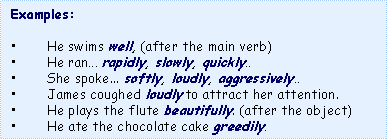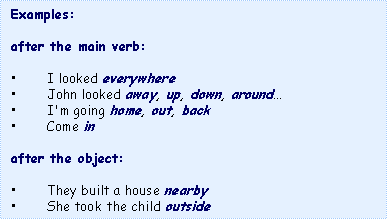POSITION OF ADVERBS:
-
Adverbs of manner
Adverbs of manner tell us how something happens. They are usually placed after the main verb or after the object.

2. Adverbs of place
Adverbs of place tell us where something happens.
They are usually placed after the main verb or after the object:

3. Adverbs of time
Adverbs of time tell us when an action happened, but also for how long, and how often.
- When:today, yesterday, later, now, last year
- For how long:all day, not long, for a while, since last year
- How often: sometimes, frequently, never, often, yearly
"When" and "For how long" adverbs are usually placed at the end of the sentence. "How often" adverbs expressing the frequency of an action are usually placed before the main verb but after auxiliary verbs (such as be, have, may, must):

4. Adverbs of degree
Adverbs of degree tell us about the intensity or degree of an action, an adjective or another adverb.
Common adverbs of degree:
Almost, nearly, quite, just, too, enough, hardly, scarcely, completely, very, extremely.
Adverbs of degree are usually placed:
- before the adjective or adverb they are modifying:
e.g. The water was extremely cold. - before the main verb:
e.g. He was just leaving. She has almost finished.

Note:
1. In English we never put an adverb between the verb and the object.
We often play handball. - CORRECT We play often handball. - WRONG 2. If there are more adverbs at the end of a sentence, the word order is normally:
Manner - Place - Time
Peter sang the song happily in the bathroom yesterday evening.
ACTIVIES:
ACTIVITY 1.Follow the link and do the exercise: https://www.aulafacil.com/cursos/ingles/repaso-de-gramatica/ejercicios-posicion-del-adverbio-en-la-oracion-l22492
Activity 2. (Optional) If you want you can send me the "liveworksheet file" to my email (g.educaand).
- before the adjective or adverb they are modifying:
liveworksheets.com



